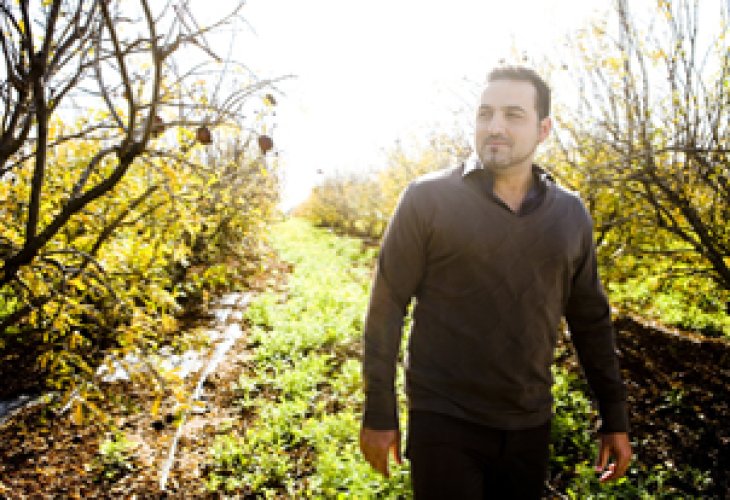For the Woman
From Tehran to Freedom: The Iranian Journalist Saved by Israel After Fleeing the Regime
How writer Neda Amin escaped censorship, threats, and near-deportation — and found safety, identity, and a new mission as a free journalist in Israel
 (Photo: shutterstock)
(Photo: shutterstock)Neda Amin was born in Tehran to a Jewish father and a Muslim mother. “My parents weren’t religious,” she explains in an interview with Yedioth. “My mother taught me about Islam and my father taught me about Judaism, but we didn’t celebrate holidays or keep any rituals — not Jewish ones and not Muslim ones.”
Amin, a journalist at heart, wrote for foreign media under a pseudonym and openly criticized injustices committed by the Iranian regime. Her writing angered the authorities, who eventually declared her wanted. With the help of the Israeli government, Amin managed to escape to Israel, where she shared her remarkable story.
Growing Up Between Two Identities
“Since childhood, I knew Israeli songs,” she recalls. “At home in Tehran, my mother listened to Iranian music and my father listened to Western music. He especially loved Hebrew songs. As a child, I would sit with him and listen, and that created a special bond between us.”
Her father knew Hebrew and translated the lyrics into Persian for her. Her grandmother on her father’s side was Jewish, and her grandfather Muslim — and since in Iran religion is determined by the father, her father grew up Muslim. Her mother is Muslim, and Neda is officially registered as Muslim, but her father always kept a quiet connection to Judaism.
“From him I heard about Jerusalem, the Western Wall, Mount Zion, and King David. He had a small Tanach and would read to me stories of the prophets and Psalms.”
This is why, she says, when she arrived in Israel, the country did not feel foreign. “It had lived in my consciousness for years. When I was taken to the Western Wall last Shabbat, I trembled with emotion — for myself and for my father. He told me about Judaism quietly; we never talked about it in public because everyone around us was Muslim.”
Clashing with the Iranian Regime
At age 16, Amin began thinking and acting independently. She published three books that infuriated Iran’s censorship authorities.
Her first book, “To Believe” — criticized the regime’s brainwashing of children from a young age.
Her second book, “Simple Crimes” — exposed everyday crimes in Iran for which no one was held accountable. For this she was summoned for interrogation and sentenced to two years’ suspended imprisonment and a hefty fine.
Her third book, “Chains” — she printed privately and illegally, distributing it to friends and several libraries. Publishing it without regime approval risked activating her suspended sentence and placing her on the blacklist of citizens who are forbidden to leave Iran forever.
“I realized I had no choice but to flee,” she says. “The only place I could think of was neighboring Turkey, because Iranians don’t need a visa. I thought I could write freely there.”
When her cousin passed away, Amin whispered to her mother at the funeral that she needed to escape. She ran home without saying goodbye, packed a few clothes, a childhood album, her laptop, her favorite guitar, and the doll her father had bought her — and boarded a train toward what she hoped would be freedom.
Persecuted Again — This Time in Turkey
In Turkey, she began writing for the Persian edition of The Times of Israel. Her work quickly drew the unwanted attention of Turkish authorities.
“They summoned me for interrogations about my writing and my connection to Israel,” she recalls. “I asked if working for Israeli media was illegal under Turkish law. They admitted it wasn’t — but said they didn’t like Israel ‘because it kills Muslims.’”
For a year and a half, she fought for her right to write while repeatedly being called in for questioning. Eventually, Turkey ordered her to leave the country within 30 days or be deported back to Iran — a death sentence.
“Without Israel’s Pressure, I Would Not Be Alive Today”
“In the month I was given, I begged for asylum from the U.S., Norway, Germany, Britain, Australia — and Israel,” she says.
“I explained that if I were deported to Iran, my life would be in danger. Every country refused, except for Israel.”
In Israel, a full rescue effort mobilized:
UN Watch launched a petition and gathered nearly 8,000 signatures.
David Horovitz, editor of The Times of Israel, contacted Israeli officials.
Interior Minister Aryeh Deri granted her a humanitarian entry visa.
The Jerusalem Journalists Association also assisted in bringing her to Israel.
But even with a valid flight ticket, Turkish police prevented her from reaching the departure gate. She was sent back and forth between Istanbul and Ankara with no answers.
“I was losing my mind. I was so close to freedom, and they shut the door in my face. I was terrified. But I told myself that despite their cruelty, I had to save myself.”
Only after intense diplomatic pressure from Israel did Turkish police finally allow her to leave. “I have no doubt,” Amin says with tears in her eyes, “that without Israel’s pressure, I would not be alive today.”
A New Life — and a Mission
“I want to stay here,” she says firmly. “To live as a free person and work as a journalist who exposes to the world what is happening in Iran and what a horrific regime runs that country.”
She supports sanctions against the Iranian regime: “It’s obvious Iran must not have nuclear weapons. If they did, it would be a massive threat to humanity. Even now, with limited power, they commit atrocities in Syria. Iran is helping destroy the Syrian people — one of its worst crimes outside its borders. Israel must remain strong and stand against Iran’s capabilities.”

